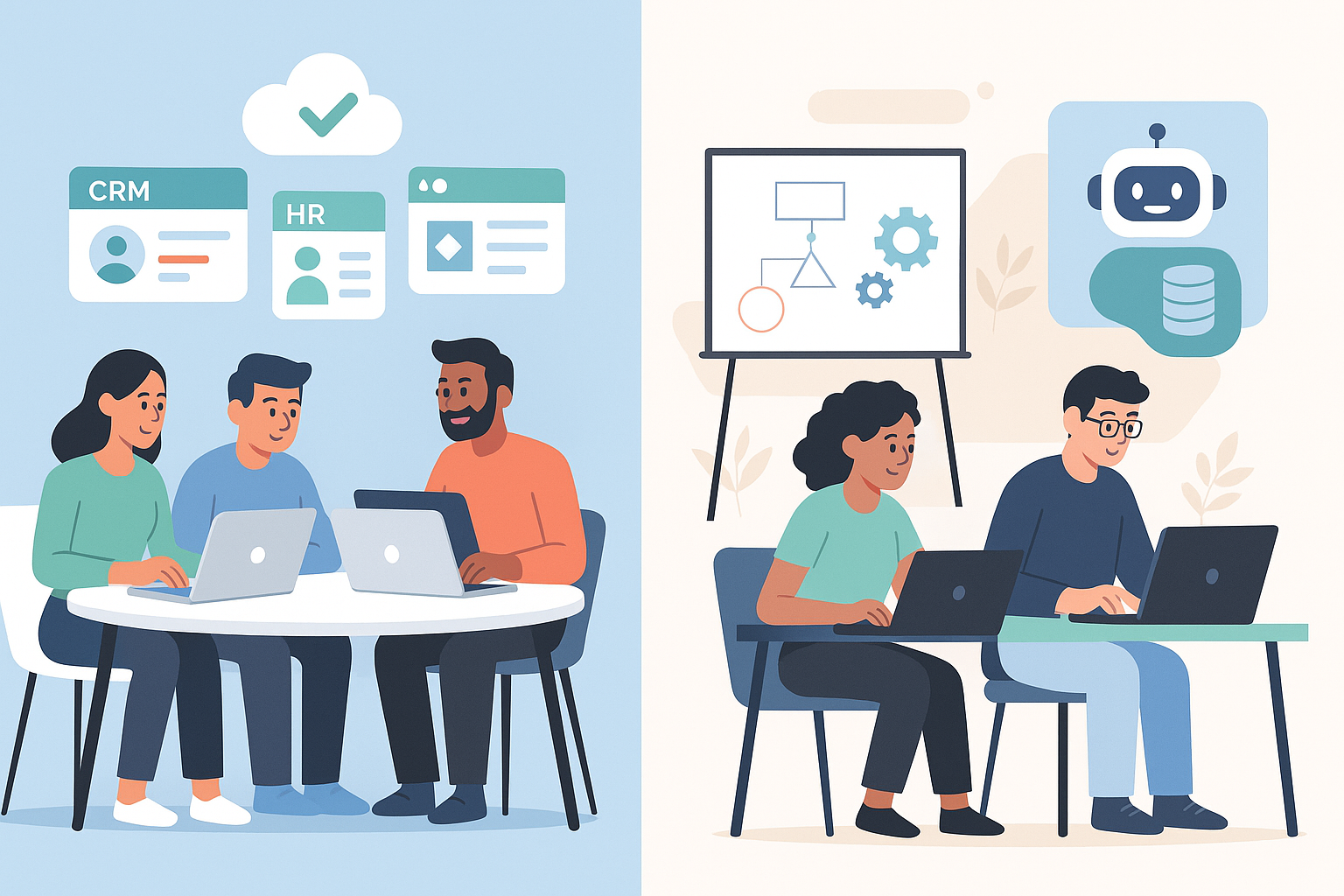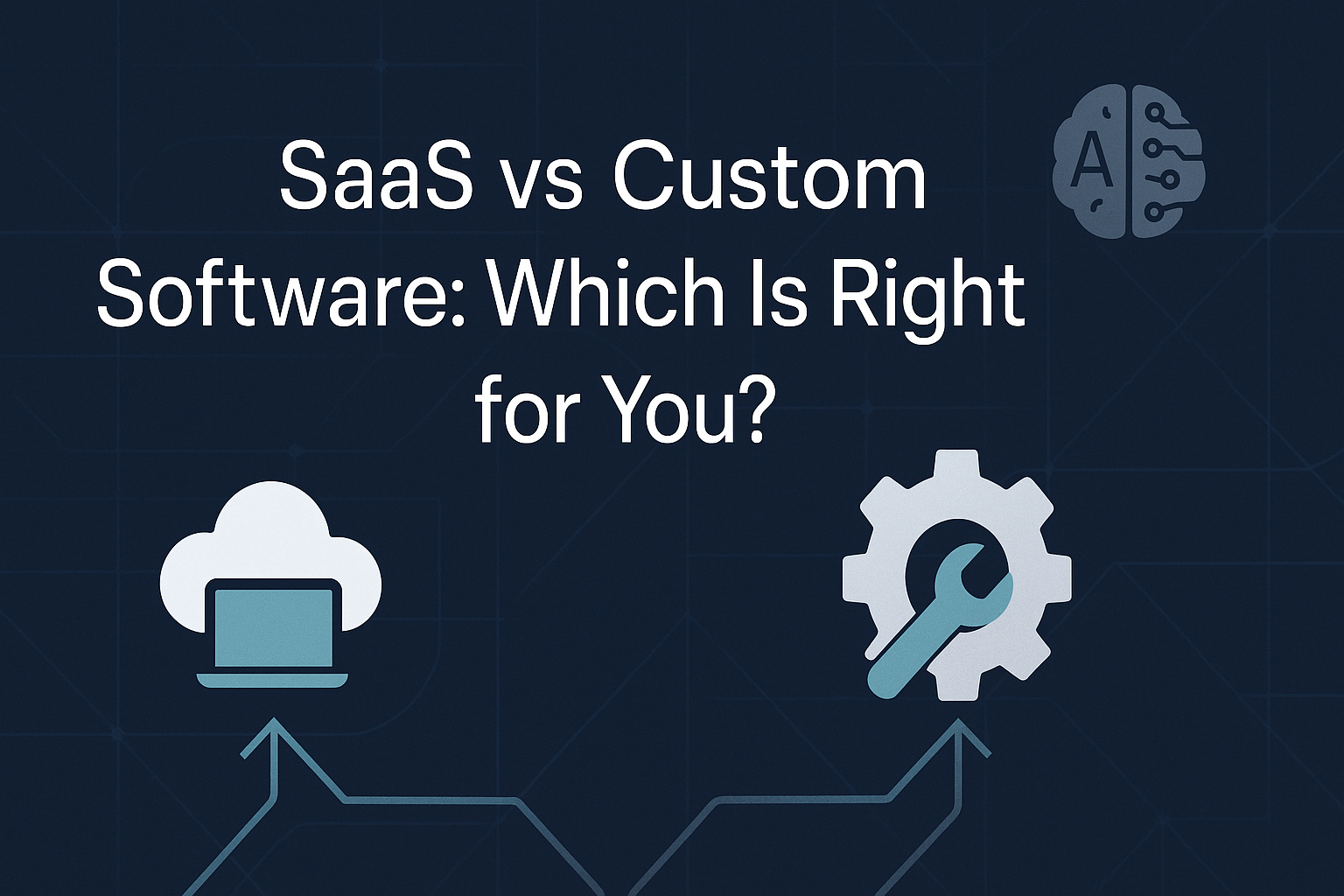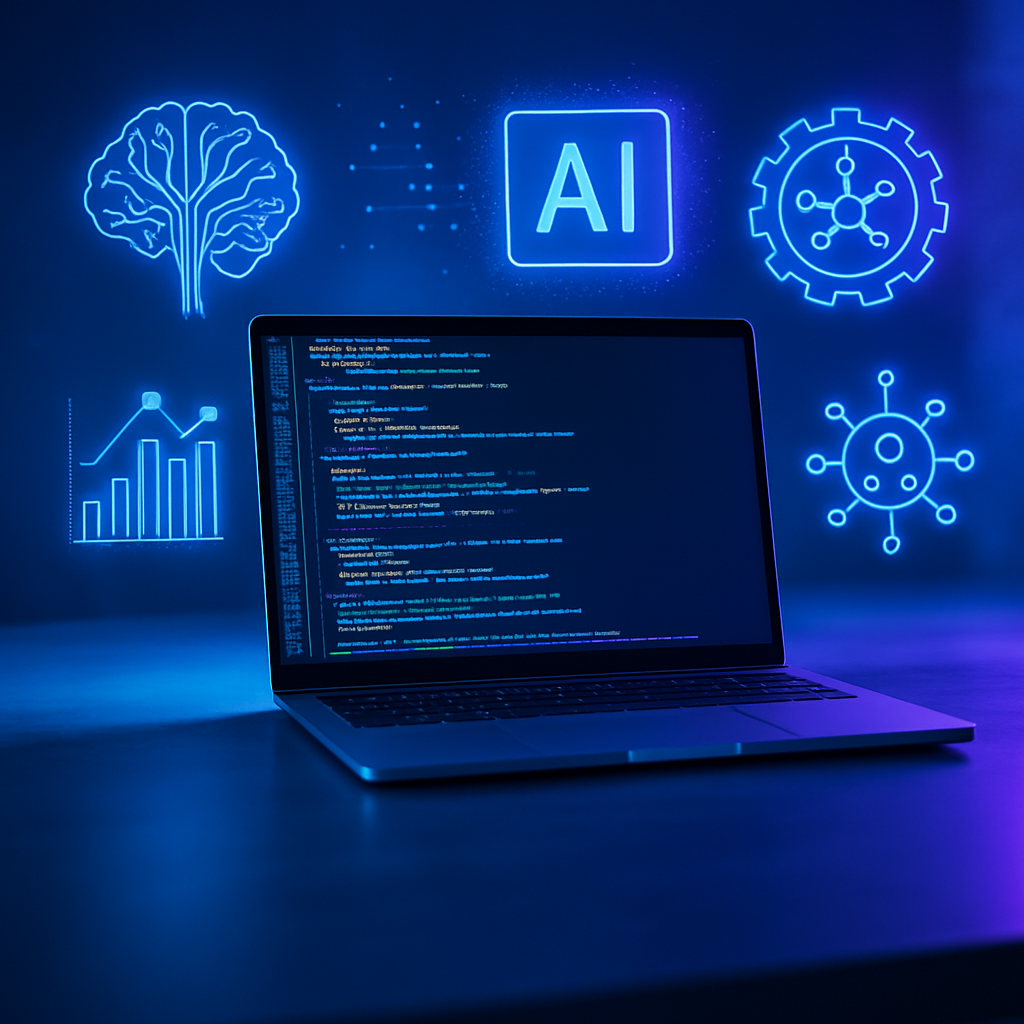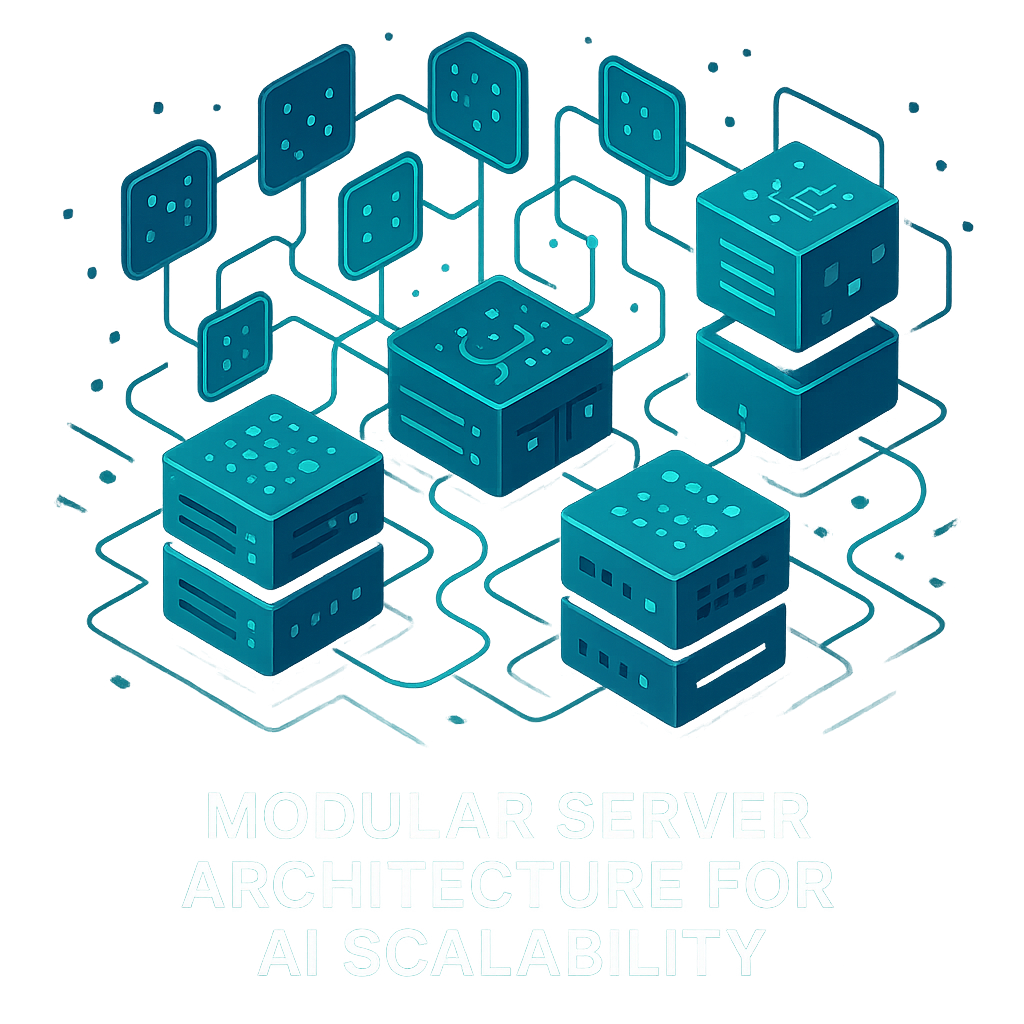SaaS vs Custom Software: Which Is Right for You

Key Takeaways
- SaaS is ideal for fast deployment and standard workflows – It offers low upfront costs, fast time-to-market, and plug-and-play functionality for CRMs, HR, and billing systems.
- Custom software offers flexibility, control, and scalability – It’s best suited for regulated industries, complex AI workflows, and businesses needing deep integration or data governance.
- AI and automation needs often tip the scale toward custom builds – SaaS may include basic AI features, but businesses requiring custom GPT AI chatbot solutions or Applied AI need tailored development.
- IT consulting firms play a crucial role in guiding the right choice – In Canada, engaging local consultants or remote software development agencies like theninjastudio ensures domain-specific expertise and execution.
- The right path depends on your goals, budget, and complexity – If you need quick wins and standard tools, go with SaaS; for long-term strategic advantage, invest in custom software development.
By 2025, more than 70% of business applications are delivered via SaaS a number projected to rise to 85% soon Netguru. Choosing between SaaS and custom software isn’t just a technical decision it’s a critical business strategy. For startups or enterprises alike, working with a seasoned software consultant or ERP software consultant, or partnering with leading IT consulting services or its consulting services firms, is often the key to the right choice.
In this article, we compare SaaS and custom development across key dimensions cost, flexibility, risks, time-to-market, integration, support, scalability with an eye toward computer software development, cloud development and operations, custom AI solutions (including custom GPT AI chatbot solutions), and how firms like theninjastudio a forward‑thinking remote software development agency can guide you. We'll also touch on software company, software developer AI trainer, application of AI, AI Automation, Applied AI, Remote Developers, and spotlight Montreal startup companies in the mix.
Understanding the Options
SaaS (Software as a Service)
Off-the-shelf cloud applications you subscribe to—hosted, maintained, updated, and supported by a software company or platform provider. Think CRM, accounting, HR, or general ERP modules.
Custom Software
Tailor-made development—built from scratch or heavily customized—aligned with your unique business workflows, compliance requirements, or AI‑driven needs.
Often delivered through IT consulting companies in Canada, Canada IT consulting firms, or IT consultancy near me, working with ERP software consultants, consultation software experts, or computer software development teams.
Market Trends & Statistics
- Over 80% of companies use at least one SaaS app, with average organizations deploying 70–112 individual SaaS tools
- As of now, 71% of businesses use cloud-based SaaS to speed up IT delivery; 63% cite flexibility, and 58% value continuity as drivers
- For growth-stage companies, SaaS holds a 72% share compared to just 28% for custom software
- In older, more regulated or specialized enterprises (>15 years old), custom software leads with 62% market share
- SaaS platforms see feature adoption rates around 62%, versus 47% for custom systems
- 60% of off-the-shelf users report integration issues, and 47% cite limited customization as their top frustration
- 72% of Series A+ SaaS startups rely on custom-built software to manage complex logic
- In Canada, IT consulting services made up about 30% of the consulting market, and businesses working with consultants observed a +23% profitability and +22% productivity boost
- The Canadian IT consulting market size hit CAD 101.5 bn in 2023, growing slightly in 2024 ($102.1 bn), with a projected CAGR of ~3.5% through 2025

SaaS vs Custom: Detailed Comparison
Cost & Budget
- SaaS: Lower upfront cost, pay-as-you-go subscription. Ideal for startups needing rapid deployment and cost predictability.
- Custom: High initial investment. Yet for enterprise-scale workflows, custom tools can reduce long-term licensing and improve ROI.
Time-to-Market
- SaaS: Instantly deployable.
- Custom: Development can take months—longer if involving advanced features like custom AI solutions, AI Automation or custom GPT AI chatbot solutions.
Flexibility & Adaptability
- SaaS: Well-suited for standard business functions (e.g. CRM, HR). Customizations may be limited or costly.
- Custom: Fully aligned with specific processes—including computer software development, application of AI, or tailored consultation software.
Integration & Compatibility
- SaaS: Often comes with APIs—good for basic integration. But mid-level complexity may expose limits.
- Custom: Ideal for deep integration with legacy and enterprise systems, compatible with industry-specific standards, or ERP platforms.
Scalability & Maintainability
- SaaS: Scales easily with user base; provider handles maintenance.
- Custom: Scales with planned development. Requires dedicated devops or cloud development and operations team.
Security & Control
- SaaS: Security and backups are provider responsibility, but some companies perceive less control.
- Custom: Offers full governance and data sovereignty—especially important in regulated industries. Many report more effective recovery from breaches (68% recovery vs 52% SaaS) Netguru.
Feature Upgrades
- SaaS: Automatically pushes updates and new features. Higher adoption rates (~62%).
- Custom: Updates can be slower; adoption around ~47% Netguru. Requires active development roadmap.
When SaaS Is Right for You
- You're a startup or small company wanting fast launch.
- You have standard workflows: CRM, billing, HR, etc.
- You plan to grow quickly, need to onboard remote developers, and use widely available tools.
- You need budget predictability and minimal IT maintenance.
- You're integrating with existing SaaS ecosystem and require less custom logic.
Ideal when paired with remote-capable software developers, Remote Developers, or Remote Software Development Agencies. If you only need some Applied AI or minor automations, many SaaS platforms offer plug‑ins or APIs.
When Custom Software Is the Better Fit
- You need tailored industry-specific workflows or ERP integration.
- You require custom solutions like custom GPT AI chatbot solutions, specialized algorithms, or proprietary automation.
- You operate in regulated environments or demand full data control.
- You're prepared to invest in computer software development, building custom application of AI, or expert software developer AI trainer capabilities.
- You plan long-term scale and flexibility. Builds are done with cloud development and operations best practices in mind.
Custom is especially valuable to Montreal startup companies working in AI and deep tech—Montreal being a global hub for Applied AI research and innovation Wikipedia.

Working With IT Consultants & Developers
In Canada
If you're in Canada—or specifically Quebec or Montreal—engaging local trusted IT consulting services or Canada IT consulting firms like CGI Inc. or Appnovation can ensure cultural alignment, regional compliance, and local support.
- CGI Inc., headquartered in Montreal, offers end-to-end software development, cloud, AI, and system integration as a top-tier software company and consulting firm.
- Appnovation, also Canadian, specializes in digital consultancy, AI, and software development tailored to enterprise growth or innovative startups.
Other consultants
Search for software consultant, ERP software consultant, software developer AI trainer, it consultancy near me, or remote software development agencies. Also ask about custom AI solutions or custom GPT AI chatbot solutions, if you need domain‑specific intelligence.
AI & Automation: SaaS vs Custom
- SaaS solutions can include standard AI modules (e.g. chatbots, analytics), but with limited customization.
- Custom AI Automation or .custom GPT AI chatbot solutions allow tailored conversational agents, trained on your data, built and fine-tuned by software developer AI trainers.
- Companies like theninjastudio specialize in blending computer software development, Applied AI, and Remote Developers to implement production-grade AI automation and custom GPT chatbots—ideal for clients requiring unique machine‑learning logic tailored to business flows.
Decision Matrix: SaaS or Custom?
Case Examples & Use‑Cases
✔ Startup with Standard Needs
Imagine a Montreal startup launching fintech SaaS to SMBs. They select off‑the‑shelf SaaS for CRM, accounting, and HR. Use a software consultant to integrate and optimize. They deploy quickly with minimal cost.
✔ Scale‑up with Custom Needs
A healthcare provider in Canada needs custom workflow, patient‑centric AI triage bots, and full data control. They partner with IT consulting services or a firm like theninjastudio to build bespoke software—including custom AI solutions and application of AI—fully hosted with tailored governance and custom GPT chatbot logic.
✔ Remote Agency Example
A product‑based company hires Remote Developers through theninjastudio to build a conversational agent, train or fine‑tune models (software developer AI trainer), integrate with back‑end systems, and deploy robust cloud operations.
Choosing the Right Path
Ask yourself:
- What are your core workflows—are they standard or unique?
- How fast do you need to launch? Do you need an MVP?
- What’s your budget—initial vs long-term?
- Do you need full control over data and processes?
- How much customization or AI integration is necessary?
- Will you need regular feature updates, new modules, or user training?
If you answer: “Quick start, standard needs, low capex”—start with SaaS, leverage software consultancy services or it consultancy near me to integrate and adapt.
If you answer: “Custom logic, AI functionality, unique workflows, long-term flexibility”—lean into custom development. Engage a firm with strength in computer software development, cloud development and operations, custom AI solutions, and ideally AI-trained developers—like theninjastudio.
Leveraging theninjastudio
When your business requires not just technology but innovation, scalability, and real AI‑driven transformation, consider partnering with theninjastudio.
- They provide remote development teams and software consultant expertise.
- They deliver custom GPT AI chatbot solutions, AI Automation, and Applied AI tailored to your domain.
- They integrate cloud architecture, training of AI models (software developer AI trainer), ERP workflows, and ongoing maintenance.
Conclusion
Choosing between SaaS and Custom Software is not a one-size-fits-all. SaaS offers speed, convenience, and cost contro perfect for startups or standard workflows. Custom software delivers control, customization, and alignment with unique or regulated business logic essential when advanced AI, integration, or tailored processes are involved.
Key drivers include budget, timeline, feature complexity, security, AI needs, and long-term scalability. Engagement with the right software consultant, ERP software consultant, or IT consulting services especially within Canada, or via remote software development agencies like theninjastudio can guide the decision and deliver results.
Frequently Asked Questions
1. What is the difference between custom software development and SaaS?
Custom software is built specifically for your business needs, offering complete control and flexibility. SaaS (Software as a Service) is a subscription-based product that serves many users with similar needs. Unlike SaaS, custom software can be tailored to your workflows and scaled uniquely.
2. Is custom software development the same as SaaS?
No. Custom software development creates a unique solution tailored to your business, while SaaS is a pre-built product that you rent and use. SaaS is ready-to-use, whereas custom software requires time and planning to build from scratch.
3. Can SaaS software be customized?
SaaS platforms allow limited customization—like branding or feature toggles—but you can't modify the core functionality. For full control and complex integrations, custom software is more flexible.
4. When should I choose custom software over SaaS?
Choose custom software when your business has unique workflows, data security requirements, or complex integrations that SaaS can’t support. It's best when scalability, long-term cost control, and competitive differentiation matter.
5. Which is more cost-effective: custom software or SaaS?
SaaS is more cost-effective short-term due to lower upfront costs. However, custom software can be more economical in the long run if you need advanced functionality, user scaling, or licensing control, especially for large teams.
6. Does custom software take longer to build?
Yes. Custom software usually takes weeks or months to develop because it’s tailored from scratch. However, using agile methods and MVPs can speed up delivery and reduce time-to-market.

%201.png)


.svg)




.svg)
